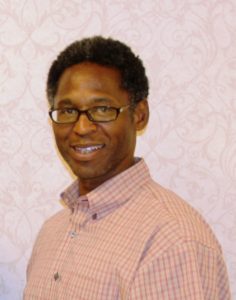 I originally conducted this interview with Dr. Vernon Morris in February of 2016 and published it in both the Examiner and the Edvocate. Not only is he a scientific peer, be he’s also a hero of mine. In addition to his duties at Howard University’s Department of Chemistry and NOAA Center for Atmospheric Sciences (NCAS), he regularly takes his group out to the schools in the DC schools system to conduct science demonstrations. He is an example of regularly being visible and helping to fulfill the needs of students in the community.
I originally conducted this interview with Dr. Vernon Morris in February of 2016 and published it in both the Examiner and the Edvocate. Not only is he a scientific peer, be he’s also a hero of mine. In addition to his duties at Howard University’s Department of Chemistry and NOAA Center for Atmospheric Sciences (NCAS), he regularly takes his group out to the schools in the DC schools system to conduct science demonstrations. He is an example of regularly being visible and helping to fulfill the needs of students in the community.
* * *
While Black History should be celebrated throughout the year and not just in February, the month provides the opportunity to not only recognize African Americans who have made significant contributions in the past, but also those who are presently making history. As there are numerous African American scientists and innovators who are typically celebrated during Black History Month in Science (Technology, Engineering and Mathematics (STEM)), there are also quite few African American scientists in modern times that are worth recognizing. One such scientist is Dr. Vernon Morris of Howard University. On Feb. 16, in honor of Black History Month, Dr. Morris granted an interview to discuss his background, the path to his current career, and potential avenues for under-represented minorities to get involved in STEM.
Anwar Dunbar: First Vernon, thank you for this opportunity to interview you. My writings in February tend to focus on Black History Month. There are African American scientists that we usually recognize such as George Washington Carver, Charles Drew, Mae Jemison and Percy Julian for example, but I realized that there are many African American scientists and innovators who are currently in the trenches expanding our scientific knowledge, and in your case making a difference in the community. You’re doing great things in and out of the lab so I thought it would great to get your story out. So with that, let’s get started.
Talk a little bit about your background. Where are you from?
Vernon Morris: I’m an Air Force brat so I don’t have a traditional home to claim, because I’ve lived in 14 different places growing up. I finished high school in eastern Washington State; Spokane. I’ve been living in Washington, DC longer than any other place, so this is my home now.
AD: Now growing up, were there any scientists in your family who you were exposed to at an early age? What got you interested in science?
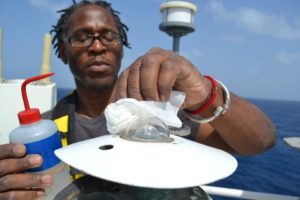 VM: No, I actually was not exposed at all. I never had the chance to do science fairs or any of that stuff. I think my first exposure to anyone who was in science was actually one of my mother’s friends, Carolyn Clay, who was an engineer from Rensselaer Polytechnic Institute (RPI). I used to talk to her a little bit and she actually got me into an engineering camp late in my high school years. After that time though, I wasn’t even thinking about going to college to be perfectly honest with you.
VM: No, I actually was not exposed at all. I never had the chance to do science fairs or any of that stuff. I think my first exposure to anyone who was in science was actually one of my mother’s friends, Carolyn Clay, who was an engineer from Rensselaer Polytechnic Institute (RPI). I used to talk to her a little bit and she actually got me into an engineering camp late in my high school years. After that time though, I wasn’t even thinking about going to college to be perfectly honest with you.
Both parents were in the Air Force. For much of my later youth my mother was a teacher and then a principal. Truthfully, the only post high school institution I was thinking about was the Air Force Academy because they had a good boxing program. I loved boxing and I thought I was pretty good. My decisions throughout most of high school revolved around how to pursue boxing.
As I said, my mother’s friend got her doctorate in chemical engineering from RPI. She had to be one of the few at that time, and I think she was working at Hanford Research Labs in Richland, Washington, which was a nuclear facility. She worked there so I would see her from time to time when she would come visit my mother.
I always did well in science, but there wasn’t much encouragement to actually do science. I liked math a lot. I liked any kind of science; physics, chemistry, biology, all of those, but I got more discouragement in school than encouragement. So she was one of the first people to say, “You know, you’re good at this stuff, so think about doing it.” So the opportunity arose to go to Seattle (University of Washington), a more populated part of the state, where the camp was held and to see that engineering was cool. I actually linked up with one of my father’s friends (a Mason) who was a steam engineer at the camp. I apprenticed with him the rest of the summer on different projects. It was interesting to see how things are being built, and how to apply the science, but it didn’t really change my course.
I ended up going to visit some friends and relatives in Atlanta. There I saw the Atlanta University (AU) complex a little bit later and frankly speaking, that had a greater influence on me. I received scholarships to go to other places, and visited them, but they didn’t have the same appeal as the AU Center. Seeing my father complete his Bachelor’s Degree toward the end of high school, really made an impression on me as well.
AD: So you went to the famous AU Center. Did you go to Clark-Atlanta, Morehouse, or Morris Brown? Which one?
VM: I went to Morehouse and I had not made up my mind on a major. I was literally running around trying to find a job and ran into Henry McBay, who is a very distinguished scholar and mentor for a lot of folks who got their chemistry degrees at Morehouse; and he basically offered to buy my books and a calculator, and take care of my school supplies if I would major in chemistry.
AD: Really?
VM: Yes, and I didn’t have enough money to say no (laughing). I said, “Sure, it’s no problem.” He told me that I would have to major in math if I majored in chemistry so that I’d understand the upper level courses. And that’s actually how I selected my major in math and chemistry. It was through Henry McBay. I was literally running to get to another part of the campus and it was oriented in such a way that the Chemistry Building was my cut through. He happened to be in the hallway and I almost ran into him. He literally told me to slow down and then asked me about where I was going, what I was trying to do, asked what my major was, and through that conversation I wound up choosing my major.
AD: Had the two of you met before? You must have made quite an impression on him for him to make that offer.
VM: No, I had never met him before. It was my first or second week at Morehouse, and he was curious about whether or not I liked Chemistry. He also introduced me to another professor who actually became my mentor later and who gave me a research job, Mr. John Hall.
AD: So you earned your Bachelor’s Degree from Morehouse. Where did you go after Morehouse?
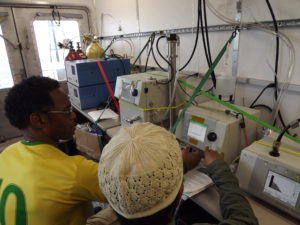 VM: From Morehouse I went to Georgia-Tech. My doctoral studies were in Atmospheric Sciences, with applications in physical chemistry, so I took a lot of courses in physical chemistry and all of the core courses in atmospheric sciences. My thesis was a combination of theoretical and experimental investigations of inorganic chlorine oxides, and the chemistry of the stratosphere. It involved the application of matrix isolation, infrared spectroscopy, some ultraviolet spectroscopy to look at short-lived intermediates, free radicals that form from low pressure and low temperature reactions. I performed quantum chemical calculations to help interpret the experimental results.
VM: From Morehouse I went to Georgia-Tech. My doctoral studies were in Atmospheric Sciences, with applications in physical chemistry, so I took a lot of courses in physical chemistry and all of the core courses in atmospheric sciences. My thesis was a combination of theoretical and experimental investigations of inorganic chlorine oxides, and the chemistry of the stratosphere. It involved the application of matrix isolation, infrared spectroscopy, some ultraviolet spectroscopy to look at short-lived intermediates, free radicals that form from low pressure and low temperature reactions. I performed quantum chemical calculations to help interpret the experimental results.
AD: And just briefly, what did you find?
VM: We found that some low temperatures stabilize some novel free radical structures that are completely unstable in the gas phase, and influence some of the heterogeneous reactions, and some of the actual gas phase chemistry that showed depletion. It was actually related to the stratospheric depletion of the ozone.
At that time the stratospheric ozone hole wasn’t a well-understood phenomenon and they were trying to figure out whether it was dynamic or if it was chemical, and it turned out to be a combination of both. We looked at the chlorine oxides in particular, extensively, and then some of the nitrogen oxides and how they contributed to the ozone depletion.
AD: Now one last question about your thesis; what got you interested in atmospheric sciences?
VM: It was John Hall. I was again in a quandary about what I wanted to do, but it was either go into chemical physics, which is what he had done, or go into a more applied field. At that point the ozone hole and stratospheric depletion of ozone in general was a really big deal and there were a lot of open questions. It just seemed like a really exciting way to take the math, the chemistry and the physics and go after these larger scale environmental problems that were presenting themselves.
A single discipline wasn’t enough to address them. You had to come in with a very multidisciplinary background. I liked physics. I tried to triple major in physics, but I it would have taken too long to finish so I just minored in it, and majored in the other two. I liked applying chemistry and physics, and I liked understanding the environment.
John Hall actually had a joint appointment between Georgia-Tech and Morehouse, and while he was encouraging me to go to UC-Berkley or to Harvard, or some of his alma maters, the opportunity to go to a different school and still work with him was appealing, and actually my first daughter was born before I graduated, so weighing the prospect of leaving and not being near her sort of factored into my decision.
AD: So at Howard University you interestingly go out to the ocean and conduct research there. Just briefly, talk about your research.
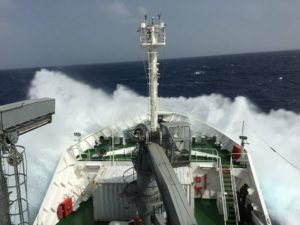 VM: We’re working on a lot of stuff, but the work revolves around trying to get a better quantitative understanding of how atmospheric particulates influence the chemistry of the atmosphere and climate across multiple scales. These are multiple spatio-temporal scales. There are time scales because the lifetime of aerosols tends to be days to months, but their influence in the atmosphere tends to range from that time scale to much longer time scales as clouds change their optical properties; that influences radiative balance and seasonal fluctuations. If you look at particle evolution, once an aerosol is formed and injected into the atmosphere from the ground layer, how does it influence and have these multiplying effects across larger spatial fields as it moves around the atmosphere, and through larger temporal scales as it effects something that has a multiple “follow on” effect?
VM: We’re working on a lot of stuff, but the work revolves around trying to get a better quantitative understanding of how atmospheric particulates influence the chemistry of the atmosphere and climate across multiple scales. These are multiple spatio-temporal scales. There are time scales because the lifetime of aerosols tends to be days to months, but their influence in the atmosphere tends to range from that time scale to much longer time scales as clouds change their optical properties; that influences radiative balance and seasonal fluctuations. If you look at particle evolution, once an aerosol is formed and injected into the atmosphere from the ground layer, how does it influence and have these multiplying effects across larger spatial fields as it moves around the atmosphere, and through larger temporal scales as it effects something that has a multiple “follow on” effect?
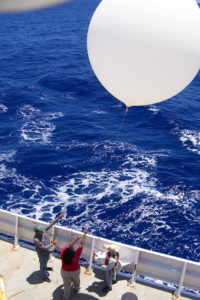 The ship experimental cruises allow us to look at the transport of aerosols that are transmitted from Africa either from the Sahara Desert or as a result of burning biomass from “Slash and Burn” agriculture. Particles get into the atmosphere and influence tropical cyclone development, and they influence acidification of the upper ocean. They also influence microbiological transfer, the transfer of microbes across hemispheres. They influence cloud properties and precipitation properties downstream and food security. So they have all of these implications that are much longer and much larger than a particular fire, or a particular dust storm. You have to connect that with field observations, laboratory studies and with space-based observations as well.
The ship experimental cruises allow us to look at the transport of aerosols that are transmitted from Africa either from the Sahara Desert or as a result of burning biomass from “Slash and Burn” agriculture. Particles get into the atmosphere and influence tropical cyclone development, and they influence acidification of the upper ocean. They also influence microbiological transfer, the transfer of microbes across hemispheres. They influence cloud properties and precipitation properties downstream and food security. So they have all of these implications that are much longer and much larger than a particular fire, or a particular dust storm. You have to connect that with field observations, laboratory studies and with space-based observations as well.
AD: My first time meeting you was here in DC at the 2012 National Organization of Chemists and Chemical Engineers (NOBCChE) annual conference where you won the Percy Julian Award for excellence in teaching. Was that for your teaching activities at Howard, or was it for the community outreach that you do at various local schools?
VM: I think it was for the combination of teaching and mentoring. In fact, I think it was the Henry McBay award actually, though there was a separate award for Percy Julian. That was very special for me because I was a McBay mentee. I think it was a combination of teaching and producing students at the university, the outreach internationally, and then the outreach locally, the way we try to get science to the community; the underserved communities in particular.
AD: I’m a pharmacologist, so my knowledge of all of the notable African American chemists is admittedly limited.
VM: Percy Julian actually designed the chemistry building here on the Howard campus. He designed this building, designed the labs, and then laid out everything and then, because of a personal dispute with the provost and the president at the time, actually left before the building was commissioned.
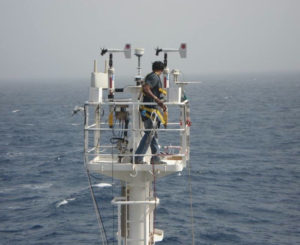 AD: You know, Vernon, as you were talking just now, I was just reflecting on how important it is to know these things. A couple of years ago a mentor who himself isn’t a scientist, but who saw that I was trying to develop my own writing and mentoring voice, gave me a copy of “Forgotten Genius”, the documentary about Percy Julian.
AD: You know, Vernon, as you were talking just now, I was just reflecting on how important it is to know these things. A couple of years ago a mentor who himself isn’t a scientist, but who saw that I was trying to develop my own writing and mentoring voice, gave me a copy of “Forgotten Genius”, the documentary about Percy Julian.
When I was I watching it, I couldn’t help but feel that Dr. Julian’s story would have been so valuable to know when I was going through my own doctoral studies. I didn’t deal with the racism that he endured, but just the scientific process; so many experiments have to be done before you finally get to the ones that actually work and generate quality data. That documentary conveyed the essence of science, and it took me a while to figure that all out while I was working on my own thesis. It would have been so valuable to know beforehand.
VM: We actually screened that film here. We used to show it on a regular basis to our chemistry majors because it’s very eye opening and shows the commitment that you have to have, in addition to some of the resilience you have to have for things to work out. That guy was brilliant.
AD: Yes, and there is a whole culture to what we do as scientists, and the story conveyed that as well.
This interview will continue in part two of A Black History Month interview with Dr. Vernon Morris. A special thank you is extended to Dr. Morris and Howard’s NCAS for providing the pictures in this post. If you’ve found value here and think it would benefit others, please share it and or leave a comment.
Please visit my YouTube channel entitled, Big Discussions76. To receive all of the most up to date content from the Big Words Blog Site, subscribe using the subscription box in the right-hand column in this post and throughout the site, or add the link to my RSS feed to your feedreader. Lastly follow me at the Big Words Blog Site Facebook page, on Twitter at @BWArePowerful, and on Instagram at @anwaryusef76. While my main areas of focus are Education, STEM and Financial Literacy, there are other blogs/sites I endorse which can be found on that particular page of my site.
